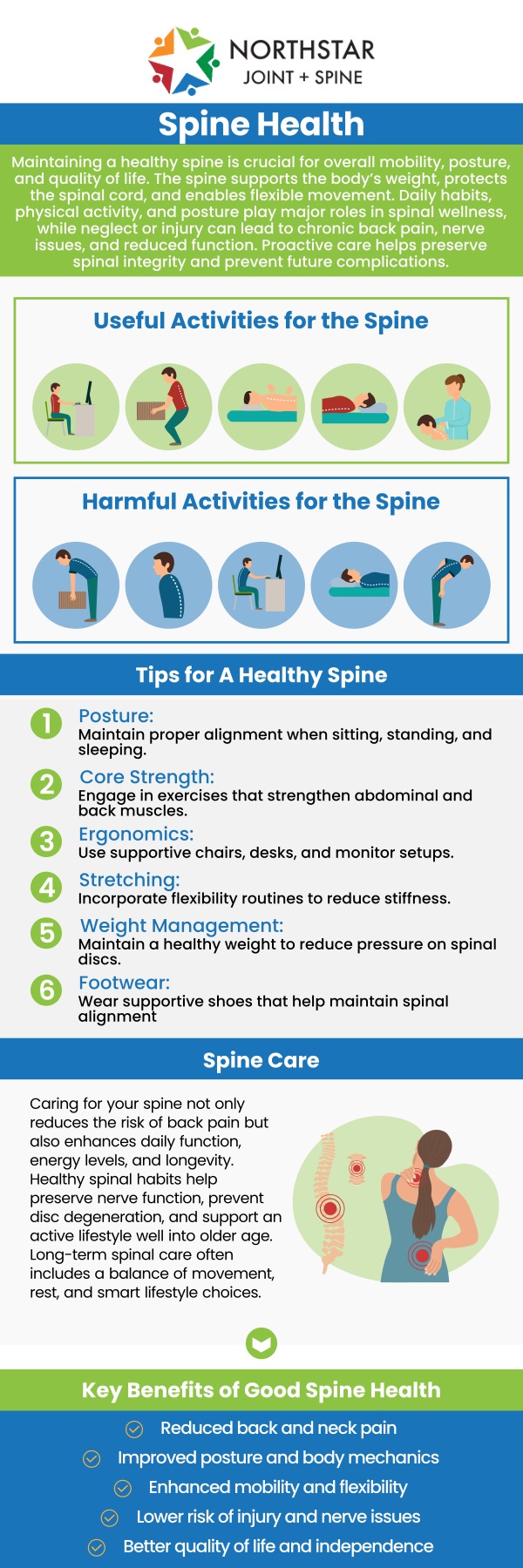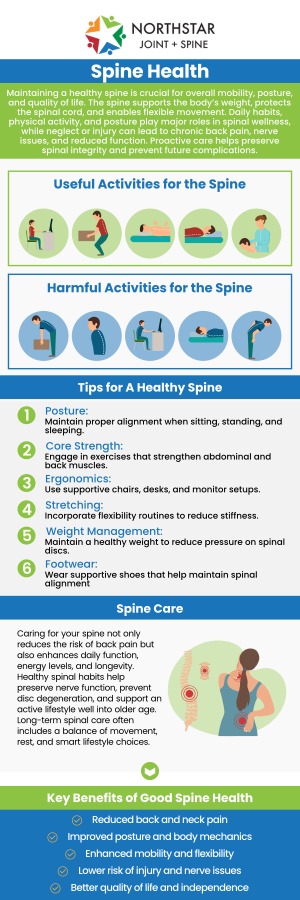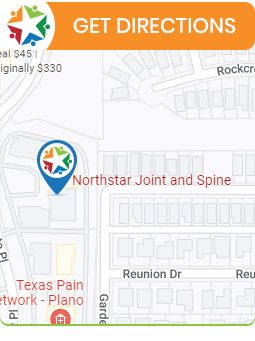The Backbone of Your Health: Understanding Spine Function and Care
The spine plays a crucial role in your overall health, providing support and flexibility to your body while protecting the spinal cord. It enables movement, balance, and posture, making it essential for daily activities. Maintaining a healthy spine through proper care, posture, and regular check-ups is vital for preventing discomfort and long-term issues. For comprehensive spine care, visit Northstar Joint and Spine, where Board Certified Dr. Robert J. Nocerini, MD, and his team are dedicated to ensuring the health and well-being of your spine. For more information, contact us today or schedule an appointment online. We are conveniently located at 7704 San Jacinto Pl Suite #200 Plano, TX 75024.


Table of Contents:
What is the Spine?
Why Is Spine Health Important?
How the Spine Can Become Compromised?
How to Care for Your Spine?
How Northstar Joint and Spine Can Help
The spine is the central structure in the human body, offering vital support to the head, neck, and torso while enabling movement. It serves as the framework for the entire body, providing the necessary support for the body’s upright posture and protecting the spinal cord. The spine is also essential for overall health, impacting everything from basic mobility to vital bodily functions. Caring for your spine is key to maintaining overall health, comfort, and functionality.
The spine, often referred to as the backbone, is a column of bones called vertebrae that extends from the skull to the pelvis. The spine is made up of 33 vertebrae, which are categorized into regions: cervical (neck), thoracic (mid and upper back), lumbar (lower back), sacrum, and coccyx (tailbone). Between each vertebra are soft, gel-like discs that act as shock absorbers, cushioning the bones and allowing for flexibility. The spine’s primary function is to support the body’s weight, protect the spinal cord, and enable movement.
In addition to providing structure and stability, the spine also serves to house the spinal cord, which is a major pathway for the communication of nerve signals from the brain to the rest of the body. This communication allows for coordination of movement, sensation, and bodily functions. Therefore, the health of your spine is directly linked to your overall nervous system health.
Spine health is fundamental to well-being for a variety of reasons. One of the most important functions of the spine is supporting the body’s weight and allowing us to maintain an upright posture. This support is crucial not only for basic functions such as standing and walking but also for engaging in more dynamic activities like running, lifting, and bending. When the spine is not in proper alignment, it can lead to discomfort, reduced mobility, and decreased overall function.
A healthy spine is essential for maintaining the flexibility and range of motion necessary for movement. The discs between the vertebrae allow for flexibility and smooth movement of the spine, enabling tasks such as twisting, bending, and reaching. Additionally, muscles surrounding the spine provide further support, keeping the body balanced and stable.
Spinal health also directly impacts overall body function. The spine protects the spinal cord, a critical part of the central nervous system. Nerve signals travel from the brain to the body via the spinal cord, which enables the proper functioning of muscles, organs, and tissues. A misalignment or dysfunction in the spine can disrupt this communication, leading to symptoms such as pain, numbness, or weakness in various parts of the body.
While the spine is a resilient structure, it is not immune to wear and tear. Over time, the discs between the vertebrae can degenerate, which may lead to stiffness, discomfort, or reduced flexibility. The spine’s health can also be compromised due to poor posture, improper body mechanics, or a lack of physical activity. For example, sitting for long periods without proper support can strain the muscles and discs of the lower back, leading to discomfort.
As we age, changes in the spine are natural and can lead to conditions such as osteoarthritis, where the cartilage that cushions the joints wears down over time, leading to stiffness and pain. Muscles around the spine can also become weaker with age, which may affect posture and increase the risk of spinal discomfort or other musculoskeletal issues. Additionally, sudden or repetitive movements that involve bending, twisting, or lifting improperly can strain the muscles and discs in the back, causing discomfort and affecting overall mobility.
Medical conditions such as scoliosis, a condition in which the spine curves abnormally, can also affect spinal health. Though often present from childhood, scoliosis can also develop later in life due to factors such as muscle imbalances or degenerative conditions. As the spine’s natural curvature becomes distorted, it may lead to pain, discomfort, and postural problems.
Caring for your spine is essential for preventing discomfort, improving mobility, and maintaining an active lifestyle. One of the most important aspects of spine care is maintaining proper posture. Whether standing, sitting, or sleeping, proper alignment of the spine reduces unnecessary strain on the muscles, ligaments, and discs. For example, sitting with the back straight and shoulders aligned helps keep the spine in its natural position and prevents muscle fatigue.
Physical activity is another key factor in promoting spine health. Regular exercise, particularly strength training, helps to build the muscles around the spine, improving stability and reducing the risk of strain. Core-strengthening exercises, such as Pilates or yoga, are especially beneficial for improving the muscles that support the spine. These exercises strengthen the abdominals, back, and pelvic muscles, which helps to maintain alignment and support the spine during daily activities.
In addition to exercise, stretching is essential for maintaining spinal flexibility and reducing stiffness. Regular stretching of the muscles in the back and neck can help improve flexibility and reduce the risk of tension or discomfort. Stretching exercises like yoga or gentle back bends can help keep the muscles and ligaments around the spine supple and functional.
A balanced diet is also important for spinal health. Proper nutrition supports muscle strength and bone density, both of which are essential for maintaining spine health. Calcium, vitamin D, and protein are crucial nutrients for supporting bone and muscle health. A diet rich in leafy greens, dairy, nuts, and lean proteins helps provide the necessary building blocks for healthy bones and muscles.
Finally, using proper body mechanics when lifting or carrying objects is essential for protecting the spine. When lifting heavy items, it is important to bend at the knees, not the waist, and to use the legs for lifting rather than relying on the back. This reduces the risk of placing unnecessary strain on the spinal muscles and discs.
At Northstar Joint and Spine, we specialize in providing comprehensive care to support spine health. Led by Board Certified Dr. Robert J. Nocerini, MD, our team offers personalized treatment plans designed to promote spinal well-being, reduce discomfort, and improve mobility. Whether you are experiencing chronic back pain, stiffness, or general discomfort, our team is here to help.
We begin by thoroughly assessing each patient’s condition using advanced tools, such as physical exams and imaging studies, to gain a clear understanding of their spine health. Based on this assessment, Dr. Nocerini develops a customized treatment plan that may include physical therapy, targeted exercises, and other non-surgical interventions. Our approach emphasizes relieving pain, improving function, and preventing future issues through education, lifestyle changes, and appropriate interventions.
At Northstar Joint and Spine, we understand that maintaining a healthy spine is essential for overall quality of life. Our team is committed to providing compassionate, expert care to help you achieve optimal spinal health, reduce discomfort, and regain mobility. For more information, contact us today or schedule an appointment online. We are conveniently located at 7704 San Jacinto Pl Suite #200 Plano, TX 75024. We serve patients from Plano TX, Willow Bend TX, Frisco TX, Allen TX, Addison TX, North Dallas TX, and surrounding areas.

Check Out Our 5 Star Reviews


Additional Services You May Need
▸ Back Pain
▸ Shoulder Pain
▸ Chronic Pain
▸ Epidural Steroid Injections
▸ Spinal Cord Stimulation
▸ Viscosupplementation
▸ Genicular Nerve Blocks
▸ Facet Injections
▸ Joint Injections
▸ Sacroiliac Joint Injections
▸ Lumbar and Cervical
▸ Facet Medial Branch Blocks
▸ Diagnostic Nerve Blocks
▸ Medication Management
▸ Neck Pain Doctor
▸ Diabetic Peripheral Neuropathy
▸ Headaches
▸ Suboxone
▸ Botox for Migraines
▸ Peripheral Nerve Stimulation
▸ Spine
▸ Joints
▸ Muscles
▸ Bones

Additional Services You May Need
▸ Back Pain
▸ Shoulder Pain
▸ Chronic Pain
▸ Epidural Steroid Injections
▸ Spinal Cord Stimulation
▸ Viscosupplementation
▸ Genicular Nerve Blocks
▸ Facet Injections
▸ Joint Injections
▸ Sacroiliac Joint Injections
▸ Lumbar and Cervical
▸ Facet Medial Branch Blocks
▸ Diagnostic Nerve Blocks
▸ Medication Management
▸ Neck Pain Doctor
▸ Diabetic Peripheral Neuropathy
▸ Headaches
▸ Suboxone
▸ Botox for Migraines
▸ Peripheral Nerve Stimulation
▸ Spine
▸ Joints
▸ Muscles
▸ Bones






